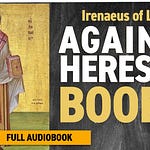Dated somewhere between the late first and early second century A.D., the Epistle of Barnabas is a work traditionally attributed to Barnabas, a companion of the Apostle Paul. The author's meticulous employment of typology, which seeks to draw meaningful connections between the events, people, and institutions of the Old Testament and their counterparts in the New Testament, gives a kind of divine life to the work wherein the reader is presented with a vision of the Holy Scriptures as a beautiful tapestry of God's love for mankind.
Amidst this profound theological exploration, however, the author of the epistle also includes certain passages that, viewed in light of contemporary knowledge, appear flawed or erroneous. For example, in Chapter 10 Barnabas explains that God forbade the consumption of Hyenas because they change sexes annually (the male becomes female and the female, male), a lore that held sway from the 6th Century B.C., in Aesop's fables, to Earnest Hemingway's 1935 book, "The Green Hills of Africa" and has only recently been proven false. In the same chapter, he writes that the weasel's reproductive system is located in its mouth (also proven false). But these simple inaccuracies should neither concern us nor overshadow the epistle's theological points.
Indeed, we can accept that the Epistle of Barnabas was simply repeating the biology of its time without allowing such anecdotal inaccuracies to diminish the overall importance of the work or its theological insights. The reason is simple: it is, in fact, a work of theology not biology – and while the author's understanding of biological fact was limited to the prevailing knowledge of his day, his theological insights stand unbound by the fetters of time. Indeed, the reader may find in reading this work that, while we may know more about biology in our day, we know far less about the prophetic typology within the Old Testament.
This account of the martyrdom of Saint Ignatius of Antioch, which was written by Ignatius's compatriots Philo of Cilicia and Rheus Agathopus who were eyewitnesses of his death, is testament to the Bishop's unwavering faith and fearless commitment to Jesus Christ. According to Tradition, the Saint drew courage by repeating the name of Jesus Christ – whom he claimed to carry with him by the etching of his name, through ceaseless prayer, on his heart. It is said that the lions that devoured the Saint in the Roman Colosseum left his heart untouched, revealing a golden inscription of the name Jesus Christ upon it. In honor of the saints courageous martyrdom, the bones of Saint Ignatius were gathered and preserved and now rest in the Basilica di San Clemente in Rome.
If you appreciate our work to bring you professionally produced audiobooks of the Church Fathers free of charge, would you support our work by joining as a paid substack member below or becoming a Patron on Patreon?
Listen on YouTube | Join Patreon
Read the Epistle of Barnabas on NewAdvent.org.













Share this post